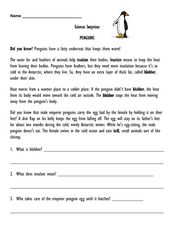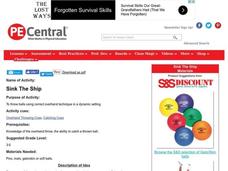Curated OER
Elephant Quiz
Students test what they know about elephants. This instructional activity contains 9 multiple choice general knowledge questions about elephants. Answers are provided.
Curated OER
The Invention of the Telephone
Learners study the history of the telephone and its inventor. In this communications lesson students complete a tuning fork experiment to further demonstrate how sound is produced.
Curated OER
Totally Cellular
For this biology worksheet, students learn about cells and their various parts. They first read a page and a half of facts about cells and then answer the 10 questions in the packet. The answers are on the last page.
Curated OER
Amazing Amphibians- Reading Comprehension
In this amazing amphibians worksheet, students read a one page essay about the characteristics of amphibians. They answer 10 true and false questions based on the reading.
Curated OER
Money
Students read this informational passage about money and then answer 5 reading comprehension question and 5 vocabulary questions. The passage contains interesting information about the origin of money and would be good reading...
Curated OER
Electric Shock: Caution!
In this electricity worksheet, students read about how electricity flows and the force that causes the flow. Students read about electric shock and then complete 3 short answer questions.
Curated OER
Science Surprises: Penguins
In this reading comprehension learning exercise, students read a 3 paragraph selection about penguins and then respond to 3 short answer questions.
Curated OER
Beginning Critical Reading - Nuts
In these critical reading worksheets, 3rd graders read the short story about nuts. Students then answer 3 critical reading questions about the passage.
Curated OER
"Had Better" and "Would Rather" Exercise-ESL
In this ESL grammar and usage worksheet, students select the correct answer, either "had better" or "would rather" to compete sentences. Answers are on page 2.
Curated OER
Phrasal Verbs of To Look
In this verb worksheet, students focus on the top phrasal verbs. Students complete 10 fill in the blank questions writing in the correct group of words for each.
Curated OER
Coqui Frog Populations
Students research Coqui frogs. Students explore the life cycle of coqui frogs and discover how these frogs have become an invasive species in Hawaii.
Curated OER
Using Blood Tests to Identify Babies and Criminals
Students solve a crime by matching a suspect's blood type to physical evidence collected at the crime scene. In this forensic science lesson, students identify the different blood types. They explain how blood tests work.
Curated OER
Marvelous Mammals Crossword
In this mammals instructional activity, students use clues given to complete a crossword puzzle of words associated with mammals. An answer key is included.
Curated OER
Anthrax Bioterrorism and Health Care
Learners describe the characteristics of anthrax infections, distinguish between the three anthrax forms and analyze the effectiveness of anthrax vaccinations. They relate anthrax to bioterrorism.
Curated OER
Vaccines--How and Why?
Twelfth graders study the history, progression and current uses for vaccines in the prevention of disease. They simulate an epidemic and experiment with pathogens.
Curated OER
Sink The Ship
Young scholars throw balls using correct overhand technique in a dynamic setting.
Other popular searches
- Healthy Skin and Hair
- Skin and Fingerprinting
- Skin and Sun Exposure
- Skin Hair and Nails
- Grooming and Skin Care
- Skin and Make Up
- Race and Skin Color
- Skin Structure and Function
- Skin and Body Membranes
- Skin Diseases and Disorders
- Human Skin and Tissue
- Skin and Hair















